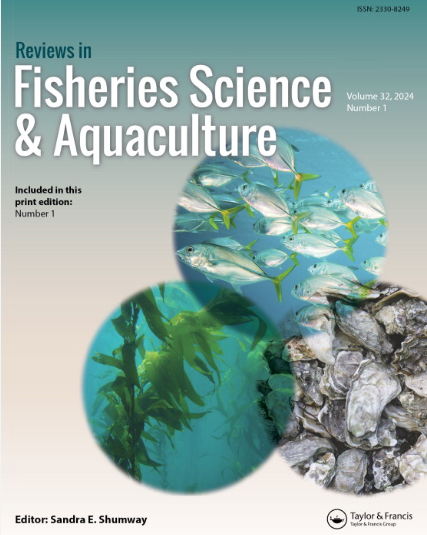驳斥海洋水产养殖神话,毫无根据的批评和假设
IF 5.3
1区 农林科学
Q1 FISHERIES
引用次数: 12
摘要
摘要可持续的国内水产养殖发展是未来实现美国海产品更大安全的关键组成部分,但有害的指控破坏了公众的支持。针对近海水产养殖及其监管的各种长期存在且不准确的神话和假设被强加给了公众。本文通过回顾当前的政策、法规、研究和行业生产实践,驳斥了最普遍的批评。这些批评包括:监管不力;将农场描述为高密度工厂,不关心食物垃圾、未经处理的排放、抗生素和抗真菌治疗的使用;海洋哺乳动物的纠缠;对野生种群和栖息地的影响;使用饲料添加剂给鱼肉上色;饲料配方中不可持续地使用鱼粉;生产廉价、低质量的产品可能扰乱市场;商业农场和商业渔民不能作为营利性企业共存。就潜在的环境、经济、社会和文化影响而言,海洋水产养殖并非没有风险,实现可持续产业仍面临挑战。这些挑战是众所周知的,美国和全球研究界都可以应对。目前的海上农业现实预示着未来的好兆头:1)如果美国法律可以修改,授予海上农民在联邦水域的财产权或使用权保障,那么全球显然迫切需要可持续地生产更多的海产品,以满足日益增长的需求,美国有海洋资源成为主要出口国;2) 美国海洋养殖户在一个非常复杂和有效的法律、监管和科学驱动的环境中工作,以预测和减轻潜在影响;3) 农场层面的管理决策以及联邦和州的监管框架共同努力,实现了环境友好的选址、运营和生产成果。4)农业社区及其在政府、大学和行业中的倡导者认识到,接触决策者、感兴趣的公众以及批评者至关重要,通过最新的研究和实证结果,准确地描述了发展的风险和回报。本文章由计算机程序翻译,如有差异,请以英文原文为准。
Refuting Marine Aquaculture Myths, Unfounded Criticisms, and Assumptions
Abstract Sustainable domestic aquaculture development is a critical component to achieving greater U.S. seafood security in the future, yet detrimental allegations have corrupted public support. A variety of longstanding and inaccurate myths and assumptions directed at offshore aquaculture farming and its regulation have been foisted on the public. This paper refutes the most prevalent critiques by reviewing current policies, regulations, research and industry production practices. These criticisms include: inadequate regulatory oversight; portrayal of farms as being high density factories unconcerned by food waste, untreated discharge, use of antibiotic and antifungal treatments; entanglement of marine mammals; impacts on wild stocks and habitats; use of feed additives to pigment fish flesh; unsustainable use of fish meal in feed formulations; potential market disruption by producing cheap, low quality products; and commercial farms and commercial fishers cannot coexist as for-profit businesses. Marine aquaculture is not risk-free in terms of potential environmental, economic, social, and cultural impacts and challenges remain to achieve a sustainable industry. These challenges are well known and addressable by the U.S. and global research community. Current offshore farming realities bode well for the future: 1) there is a clear global imperative to sustainably produce more seafood to meet growing demand and the U.S. has the marine resources to become a major exporter, if U.S. law can be amended to grant offshore farmers a property right or security of tenure for sites in federal waters; 2) U.S. ocean farmers work within a very complex and effective legal, regulatory, science-driven environment to anticipate and mitigate potential impacts; 3) farm level management decisions and federal and state regulatory frameworks have worked together to bring about environmentally friendly siting, operational, and production outcomes, and 4) the farming community and its advocates in government, universities, and industry recognize it is essential to reach out to decision-makers and the interested public, as well as critics, with the latest research and empirical results to present an accurate picture of risks and rewards to development.
求助全文
通过发布文献求助,成功后即可免费获取论文全文。
去求助
来源期刊

Reviews in Fisheries Science & Aquaculture
FISHERIES-
CiteScore
25.20
自引率
0.90%
发文量
19
期刊介绍:
Reviews in Fisheries Science & Aquaculture provides an important forum for the publication of up-to-date reviews covering a broad range of subject areas including management, aquaculture, taxonomy, behavior, stock identification, genetics, nutrition, and physiology. Issues concerning finfish and aquatic invertebrates prized for their economic or recreational importance, their value as indicators of environmental health, or their natural beauty are addressed. An important resource that keeps you apprised of the latest changes in the field, each issue of Reviews in Fisheries Science & Aquaculture presents useful information to fisheries and aquaculture scientists in academia, state and federal natural resources agencies, and the private sector.
 求助内容:
求助内容: 应助结果提醒方式:
应助结果提醒方式:


